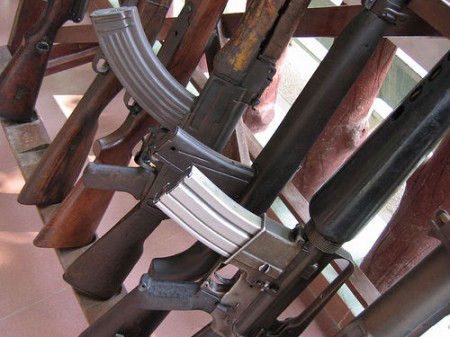An alleged international weapons trafficker, searched for by Interpol and placed under an international travel ban by the UN, will soon be running free?
What is that about?

On 11 August, a Thai court ruled against extraditing Viktor Bout to the US. The US is accusing Bout of trying to sell weapons to the Colombian rebel group FARC, a group that is deliberately targeting Americans assisting the Colombian government in the drug war. (A year ago, ISN Security Watch featured an in-depth analysis on Victor Bout’s unsavory career: see part I and part II).
Yet unlike the US and the EU, Thailand does not consider the FARC a terrorist group – hence, in the eyes of the Thai judge, Bout cannot be extradited for ‘political’ reasons. This is a big slap in the face for US counterterrorism efforts. To capture international terrorists and those supplying them with weapons, the US relies on a strong network of allies – and Thailand has historically been a strong ally of the US.
At the same time, however, Thailand is cultivating close relations with Russia, which has been able to expand its power in the Pacific region due to its vast energy resources on which emerging economies like Thailand depend. The Russians have made it crystal clear that they wanted Bout, a former military officer with strong ties to the Russian intelligence establishment, to return home. Russia is supplying Thailand with cheap, low-grade diesel, as well as well-priced Russian battleships. Some may argue that Thailand did not want to alienate its ally Russia by extraditing Bout to the US. But is it worth for Thailand to alienate an equally important ally, the United States, instead? I don’t think that makes a lot of sense.
Or should the ruling of the Thai court be interpreted as having been motivated by domestic political considerations as the current Thai government does not want to be seen as giving in to US ‘bullying’? This is an equally unsatisfactory explanation. Thailand would not have had to extradite Bout just to do a ‘special favor’ to the US. There is enough evidence that Bout bloodied his hands by selling weapons to rebel groups involved in brutal civil wars in Africa, Afghanistan, Colombia and Lebanon – and Bout’s customers have been involved in the most grueling human rights violations. An appeal to the human conscience could have sealed the deal with the Thai people, one would think.
Yet Thailand argues that its domestic laws do not provide for trying “aliens killing aliens outside of Thailand.” This sounds very 20th century to me. It shows that when it comes to illegal arms trade, international legal mechanisms have not yet made the transition into the 21st century and hence the new realities of the post-Cold War globalized world. The Bout case demonstrates that we urgently need an effective Arms Trade Treaty, as is under discussion at the United Nations (also see this Saferworld report).
Ultimately, the possible release of Viktor Bout by the Thai court is not Thailand’s or the United States’ problem first and foremost. It is the international community’s problem. I think that if strong legal mechanisms were in place to combat arms traffickers like Bout, Thailand would have found it much more difficult to let Bout run free.

